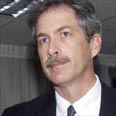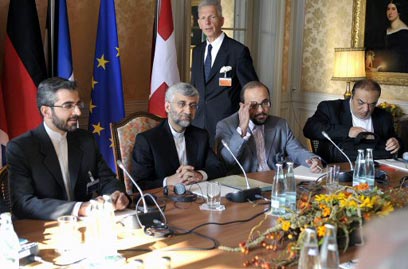
Nuclear talks: Iranian, US officials meet bilaterally
As six world powers meet with Iran over concerns about Tehran's nuclear program, US under secretary of defense meets chief Iranian negotiator during lunch break for first high-level meeting between Washington and Tehran in years. US says process can't be 'phony', while Iran warns against 'logic of force'
The US says senior American and Iranian delegates have met one-on-one on the sidelines of a high-stakes gathering on Tehran's nuclear program.
US spokesman Robert Wood says US Under Secretary of State William Burns met with Saeed Jalili, Tehran's chief negotiator.
Western diplomats said the two discussed issues during a lunch break at Thursday's seven-nation talks in Geneva. Wood, and two Western diplomats who demanded anonymity for discussing the confidential information, declined to elaborate.

Saeed Jalili and his colleagues around the negotiating table (Photo: AFP)
It is the first known direct high-level meeting between Washington and Tehran in years of attempts to persuade Iran to freeze its uranium enrichment program. Iran says the program is peaceful, some western nations fear it could eventually produce nuclear weapons.
The "significant" bilateral conversation took place during talks between Iran and six world powers near Geneva, an official at the talks said. Iran declined to confirm the two-way meeting.
The negotiations outside Geneva, also attended by Britain, France, Germany, Russia and China, took place against a backdrop of renewed international concern prompted by Iran's revelation it has a second uranium enrichment facility.
Washington had said it would not threaten further sanctions against Tehran at the one-day meeting but had prepared them in case the discussions made no progress.
"This can't be a phony process," a senior US official said in Washington.
Tehran says its nuclear program is designed purely for generating electricity and had ruled out discussing it, saying the talks should focus on issues like Afghanistan instead.
But a Western diplomat close to the meeting said Iran's nuclear negotiator had touched on it in his opening statement.
Sanctions - to impose or not to impose?
A Western diplomat said the issue of the second enrichment facility at Qom had been raised. The West wants Iran to allow immediate UN inspections at the plant, which Tehran revealed last week, and give access to documents and employees.
The diplomat said it was not yet clear if the Iranians would compromise on the wider issue of suspending uranium enrichment, as demanded by five UN Security Council resolutions.
Ali Akbar Javanfekr, an adviser to President Mahmoud Ahmadinejad, warned the West against using what he called "the logic of force" in comments to Reuters.
An Iranian official who declined to be named said Iran wanted the talks to succeed. "We want logic to dominate the atmosphere of the talks," the official said.
In Washington, senior Obama administration officials said the United States would not threaten Iran with fresh sanctions.
But one official said the United States has been preparing "a range of areas" in which to pursue sanctions if Tehran ignores Western entreaties about its nuclear program.
These could be applied through the UN Security Council or by individual states. Experts believe they may be targeted at the energy sector.
Iran's English-language Press TV said later: "Iran and the 5+1 (powers) agree to hold talks again before the end of October." It did not give a source. Obama has said he wants progress before the end of the year.










